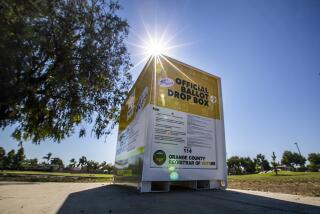Apathy Stands In as American Condition
- Share via
The comparisons are invidious: the triumph of democratic participation in the Philippines versus the tragedy of non-participation in the United States. Filipino courage, American apathy.
These comparisons are also misleading, for the facts tell only a partial story.
Nothing can or should gainsay the dramatic demonstration of democratic commitment and involvement of the Filipino people and the changes that they have wrought. In particular: the ability of Ferdinand E. Marcos’ opposition to organize itself into a disciplined political force; the willingness of millions to vote in the face of complex procedures and real fear for life and limb; the risks taken by 100,000 or more citizens who worked under the organizational umbrella of the National Movement for Free Elections to try to ensure a fair vote and, in its aftermath, to publicize its unfairness, and the willingness of thousands to interpose themselves between Marcos’ tanks and the military leaders who gambled their lives on making a nonviolent change of government possible.
Nor can we deny the stark fact that Americans are the least-participating people of any democracy in the world. In the 1984 presidential election more than 80 million eligible Americans chose not to vote. In the coming congressional elections more than 100 million are likely not to cast ballots. In the last two decades 20 million citizens have ceased voting. For this year’s vote the real outcome is likely to read Non-Voters 65%, Democrats 18%, Republicans 17%.
These facts, while accurate, do not speak to why participation was so high in the Philippines and continues to be so low in the United States.
In the Philippines the citizens were given a chance to throw off the shackles of tyranny, intimidation and corruption. And quite naturally they availed themselves of that opportunity.
In the United States in the last two decades the electorate has been confronted with choices that represent neither the best individuals whom the two major parties could nominate nor the best articulation of the issues that the nation confronts.
The sad fact of American political life is that non-voting is increasingly becoming a rational act. Some of the practical drawbacks: Ours is the only election system in the world in which the principal burden for qualifying to vote falls on the individual. In many jurisdictions several elections are held every year. Ballots are too long, polling places too few, hours for registration and voting too short.
We have an education system that is too much committed to providing the tools to earn a buck, too little committed to providing the values, skills and civic education necessary to develop an enlightened and participating citizenry.
We have a television-shaped society of spectators and consumers rather than investors and participants in the political process. With the viewing fare provided, it is a wonder that the collective American mind has not turned to mush.
We have campaigns conducted primarily through negative televised advertising that brings into question not only the integrity of the individual candidate but also the political process as a whole.
Our political marketplace increasingly is becoming one in which voters are asked to say no: against Barry Goldwater in 1964, against Lyndon B. Johnson in 1968, against George McGovern in 1972, against the Watergate excesses of Richard M. Nixon in 1974 and ‘76, against Jimmy Carter in 1980 and against Walter F. Mondale in 1984.
And we have problems that persist no matter who gets elected. The rich get richer, the poor get poorer; our traffic jams get larger and longer; full employment seems an elusive mirage, and peace always seems to be in peril.
Yet there is plenty of evidence that Americans will participate when a strong candidate or cause offers realistic hope for change. In the 1960s countless blacks risked abuse, or worse, to have the right to vote and be served in public accommodations. In 1968 millions of Americans frustrated by the Vietnam War worked and voted to force President Johnson out of his reelection bid.
The premise of democracy is faith--faith in the decency, common sense and good judgment of the individual citizen; faith that in granting the citizenry the ultimate power over the sovereignty of the nation state it will act wisely and govern well.
Given the opportunity after 20 years of increasingly corrupt and autocratic rule, the citizens of the Philippines responded to the challenge of democracy and the faith reposed in them with a stirring display of courage, discipline and involvement that vindicated the democratic premise.
There is no reason to believe that, faced with a similar challenge, the American citizenry would respond any differently.
The American tragedy is not the lack of participation by the citizenry, but the failure of leadership--in the education of the populace, in the conduct of our elections, in the choices provided in the political marketplace--to make that participation seem worthwhile.
More to Read
Sign up for Essential California
The most important California stories and recommendations in your inbox every morning.
You may occasionally receive promotional content from the Los Angeles Times.










